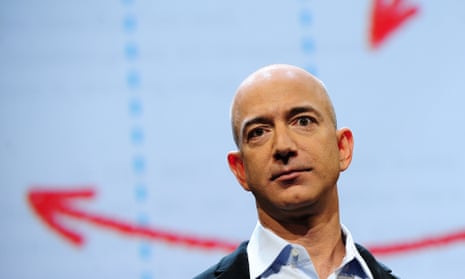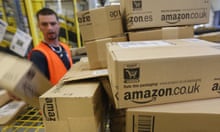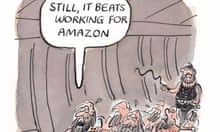Few things in life are as universally satisfying as a boycott. To the left, a boycott is the ultimate display of society in action; to the right, it confirms the market’s all-consuming power. To me, it’s just fun. It’s negging, basically – if you love something, ignore it until it comes cowering back promising to do better.
My list of personal boycotts is long and fluid. I’m currently boycotting Katie Hopkins, for example, because I am a sensible human with a functioning brain. I do my best to boycott Uber too, although admittedly that one got quite a lot easier since I moved to a town where Uber doesn’t exist. I’m also boycotting a local sweet shop, purely because the woman who runs it has got a bit of a gob on her, and you have to spend 20 minutes listening to what she had for her dinner before you’re allowed to ask for some jelly beans. But, somehow, I haven’t managed to boycott Amazon yet.
That’s weird, because so many other people have, and for so many different reasons. They boycott Amazon for its attitude towards corporation tax (previously miserly, in May Amazon announced a change in policy that means it will now pay the tax). They boycott Amazon for how it roughhouses publishers. They boycott Amazon for dropping WikiLeaks from its web servers, or threaten a boycott if they don’t withdraw items that promote paedophilia or just have Keep Calm and Rape a Lot written on them in massive letters. People were boycotting Amazon in the 90s, and they’re still doing it today.
But I haven’t. And, chances are, it’s for the same reason that you haven’t boycotted Amazon – because the convenience of buying stuff in my pants on a laptop on my sofa slightly outweighs my sense of moral discomfort, and also because parcels make me feel special. But the New York Times has just published a lengthy piece about Amazon’s godawful corporate practices and as a result my resolve has been tested more than ever. Because Amazon sounds like a terrible place to work. The worst.
Imagine an alternate reality where only Apprentice candidates are allowed to have children. Imagine if those children – those hair-gelled, big-tied, awful, self-serving children who all look like weaponised letting agents – grew up and had children of their own, and that generation was worse than the last, and the next was worse than that, and this went on for several thousand years until mankind only communicated in soundbites about how much like a shark they were. In this alternate reality, all companies would behave like Amazon apparently does now.
The conditions of some Amazon warehouses – such as the one in Pennsylvania that made headlines four years ago; the one so hot that ambulances were literally on standby outside to take workers to hospital once they inevitably keeled over – you probably knew about. But it turns out that the company’s office culture is just as comically horrific.
I’ll let you read the NYT piece for yourself, because it’s legitimately jaw-dropping, but it paints a nightmarish picture of people getting stress ulcers and being expected to reply to emails at midnight, of lacerating criticism and workers sobbing relentlessly at their desks. One employee describes being given a low-performance rating after returning from treatment for her thyroid cancer. Another miscarried twins, and claims she was told: “From where you are in life, trying to start a family, I don’t know if this is the right place for you.” It paints a picture of Amazon as a vampire that grabs newcomers and bleeds them out, before dumping them out on the street with a shrug.
It’s as if the entire company accidentally misread the film Whiplash as an employee training manual. Reading the piece, you start to wonder if Amazon paid so much money for Jeremy Clarkson’s new show not because it thinks cars and bootcut jeans are cool, but because it just really wanted to endorse the notion of workplace bullying.
Everyone has a different level of tolerance when it comes to boycotts. Some chose to boycott Amazon when they realised that it had put small independent bookstores – such as the one Meg Ryan had in You’ve Got Mail – out of business. Others chose to boycott Amazon when they realised that it had put giant chains of bookstores – such as the one Tom Hanks had in You’ve Got Mail – out of business. Others won’t boycott it until eight or nine years from now, when an unmanned drone carrying a Mr Coffee ECM160 4-Cup Steam Espresso Machine whirls out of control and crashes into a primary school.
But, for me, it might just be this. A company that doesn’t respect its own workers doesn’t deserve my money. And I’m certain that I’m not alone here, given Jeff Bezos’s fast and unusually public rebuttal of the piece (he emailed a memo to all his staff saying “The article doesn’t describe the Amazon I know” and asked them to forward HR concerns directly to him). Sure, I’m certain that I’ll slip from time to time – because, again, I really do love parcels – but this feels like a line in the sand. I need to think long and hard before I buy anything from Amazon again.
How can Amazon pull itself out of this mess? Simple. It needs to embrace its role as a villain too convenient to abandon. It needs to smash a tenth of its items with a hammer before sending them out. It needs to introduce a customer service helpline that just plays automated mocking laughter at you. It needs to become the obnoxious boyfriend you can’t leave, the Ryanair of internet commerce. Or, you know, failing that, it could just get its bloody act together. That’d work too.







